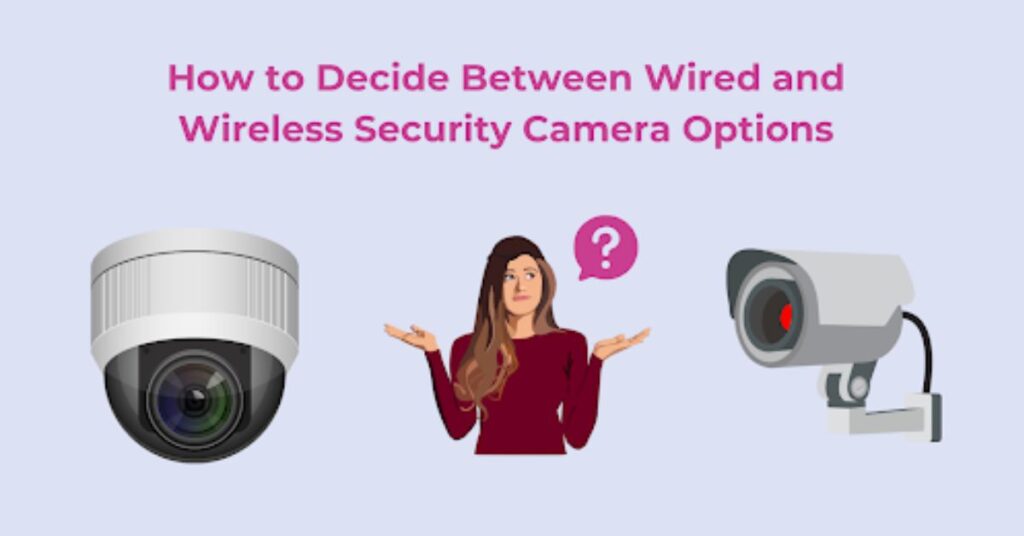Are you torn between choosing a wired or wireless security camera to protect your home or business? Safety concerns are growing, and finding the right security solution can be very overwhelming.
Wired systems give you an unmatched reliability that you may not find elsewhere, but wireless options come with flexibility and convenience. Which one is best suited for you?
This blog will simplify the decision, breaking down everything you need to know to secure your property with confidence.
Understanding Wired Security Cameras
Wired security cameras connect to power sources and recording devices through cables. They are very popular in home security cameras and business security cameras due to their reliability and constant monitoring capabilities.
This camera is used in larger properties like homes, offices, and stores where uninterrupted surveillance is essential.
- Key Benefits of Wired Cameras
Wired systems offer reliability with stable video feeds, free from interruptions due to Wi-Fi issues. They can operate 24/7 without any help from batteries, perfect for properties that require surveillance day in and day out.
For extensive premises, wired cameras are amazing for security systems of big businesses and home security camera installations where long-term monitoring is demanded.
- Limitations of Wired Cameras
Wired cameras are more difficult to install. Installation costs of wired security systems can be higher, as professional camera installation might be required for setting up the cables. Once installed, it is hard and costly to move these cameras around.
Exploring Wireless Security Cameras
Wireless cameras are a flexible and popular choice for home security cameras and business security systems. They work on Wi-Fi or batteries, avoiding cables, making them perfect for small business security cameras and homes.
Many businesses rely on dispensary live security surveillance to monitor critical areas in real-time, ensuring quick action against potential threats. These cameras are adaptable and perfect for video surveillance systems where frequent adjustments are needed.
- Wireless Security Camera Benefits
Wireless cameras are easy-to-install security systems. No complicated wiring is required, and installations can be completed quickly without needing a professional installer Live video monitoring is supported to view your feeds through smartphones or computers. This flexibility makes them one of the top choices for small business security systems or rental properties.
- Limitations of Wireless Cameras
However, Wi-Fi security camera challenges arise if the internet connection is bad, delaying or stopping the feed. Furthermore, battery-powered security cameras require maintenance like recharging or replacing batteries.
Comparing Wired vs Wireless Security Cameras
| Criteria | Wired Security Cameras | Wireless Security Cameras |
| Installation | Requires professional camera installation | Easy-to-install security systems; DIY-friendly |
| Connectivity | Wired security system reliability | Wi-Fi-dependent; prone to disruptions |
| Power Source | Continuous, cable-powered operation | Battery-powered or plugged in |
| Flexibility | Fixed placement | Portable and flexible |
| Cost | Higher upfront and installation cost | Lower upfront cost |
| Long-Term Maintenance | Minimal maintenance | Regular battery-powered upkeep |
Choosing the Right Security Camera System
When choosing between wired vs wireless security cameras, keep these key factors in mind:
- Property Size
For large areas such as homes, warehouses, or offices, it is best to use wired cameras. They provide a wired security system reliability and have more ground coverage with stable connections.
For small areas such as apartments, rentals, or small offices, wireless cameras are perfect. These easy-to-install security systems work well in areas where minimal setup is needed.
- Security Needs
If you need continuous monitoring for your home or business, go with wired security cameras. They are perfect for 24/7 surveillance and reliable business security camera systems.
If flexibility matters, opt for wireless systems. Cameras are easily moved around, and they are perfect for small business security systems or rental spaces.
- Budget
Wired systems are more expensive upfront with cables and installation but require less maintenance, making them a good long-term video surveillance system choice.
Wireless cameras are cheaper to install, but there may be recurring costs with battery-powered security cameras and replacement.
- Internet Connectivity
Wi-Fi should be strong for wireless cameras, and weak signals will easily cause Wi-Fi security camera delays or interruptions.
Wired cameras should be chosen if your internet connection is unreliable. They’re dependable and work well with home security cameras and security cameras for businesses.
Practical Use Cases for Home and Business Security Cameras
For homeowners, a wired home security camera system is perfect for large properties with multiple entry points, offering reliable and constant coverage. Smaller homes or vacation properties can use wireless cameras for easy setup and remote live video monitoring through smartphones.
Renters prefer easy-to-install security systems like wireless cameras because they are portable and require no invasive setup. Small businesses will find that business security cameras combined with live video surveillance work best.
Wired cameras can be used to cover entrances for reliable monitoring, and wireless cameras add flexibility in case the spaces or storage areas change.
Cost of Wired vs Wireless Security Systems
When comparing the cost of wired vs wireless security systems, short-term and long-term expenses matter. Wired systems have a high initial cost in terms of installation and cables, but their maintenance cost is minimal, making them a good investment for reliable coverage.
Wireless systems, on the other hand, have a low initial cost, making them ideal for budget-conscious homeowners and small businesses. However, the cost of regular expenses like batteries and minor repairs will add up over time.
For those who want immediate cost savings, wireless cameras are a perfect answer, but wired systems represent an investment for consistent, dependable security.
Making the Right Choice
The choice between a wired and wireless security camera depends on the size of your property, budget, and specific needs.
For reliability, continuous monitoring, and large spaces, wired security systems are the best. If you need wireless security camera benefits like quick installation, remote access, and flexibility, wireless cameras are ideal.
By weighing your options carefully, you can select a system that ensures safety, convenience, and peace of mind—whether it’s for your home, rental property, or business.
FAQs on Wired and Wireless Security Camera
Can a Security Camera Be Both Wired and Wireless?
Yes, some security cameras are hybrids, meaning they can work both wired and wireless. Such cameras can connect through cables to power and data or utilize Wi-Fi for wireless operation; thus, flexibility depends on your needs.
Is It Better to Have Wired or Wireless Security Cameras?
It all depends on your needs. Wired security cameras are the way to go for reliability, continuous monitoring, and larger properties. Wireless security cameras work best for flexibility, easy installation, and access from anywhere, ideal for smaller spaces or renters.
Can You Make a Wired Security Camera Wireless?
Yes, it is possible to make a wired security camera wireless. This can be done with the use of a wireless adapter or a Wi-Fi bridge. They connect the camera wirelessly to your network but require a power source for their functioning.







